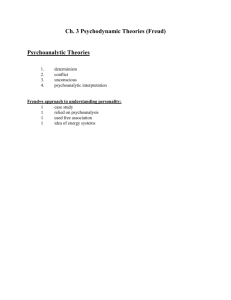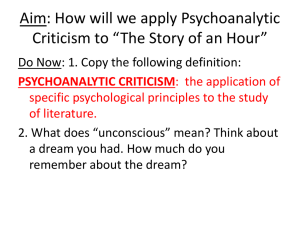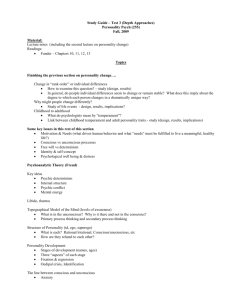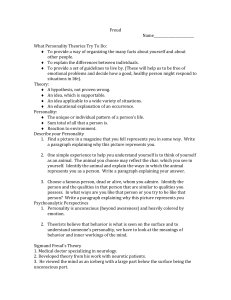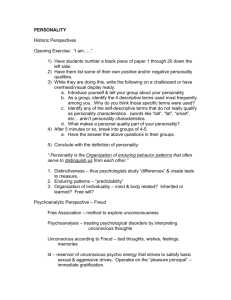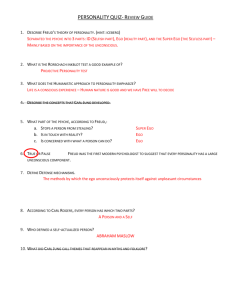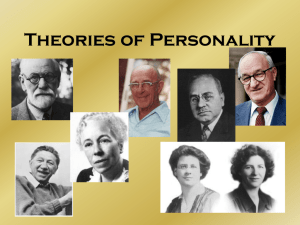Chapter 13 Personality
advertisement
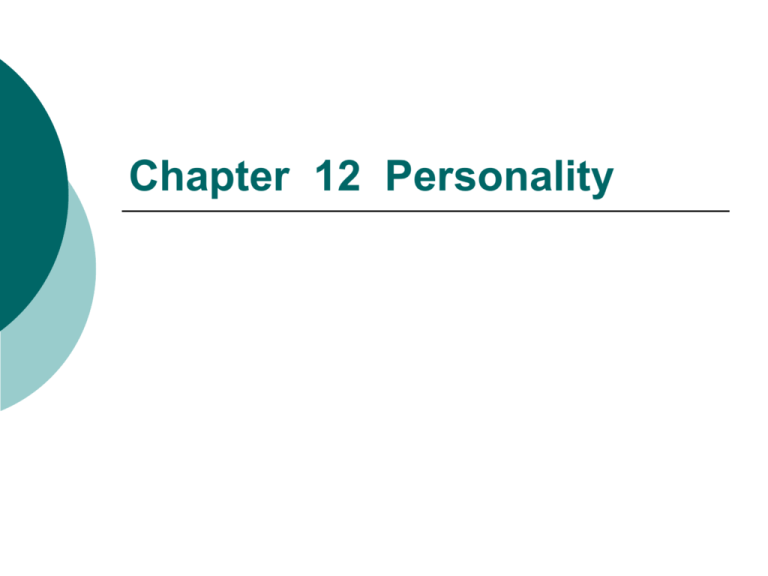
Chapter 12 Personality Persona An The Definition individual’s characteristic pattern of thinking, feeling, and acting (text book) The pattern of psychological and behavioral characteristics by which each person can be compared and contrasted with others (from another text book) Theories of personality ~ are hypothetical statements about the structure and functioning of individual personalities. They help to achieve two of the major goals of psychology: 1. Understanding the structure, origins, and correlates of personalities; 2. Predicting behavior and life events based on what we know about personnality Freud’s psychoanalytic or psychodynamic approach •Sigmund Freud (1856-1939) •Background Psychoanalysis A set of theoretical ideas about personality and a method of psycho-therapy The technique of treating psychological disorders by seeking to expose and interpret unconscious tensions. Psychiatrists vs psychologists in the field Exploring the Unconscious Conscious Preconscious — information that is not conscious but is retrievable into conscious awareness Unconscious — according to Freud, a reservoir of mostly unacceptable thoughts, wishes, feelings, and memories. According to contemporary research, information processing of which we are unaware Personality Structure id — the unconscious portion of personality that contains basic impulses and urges Libido — the psychic energy contained in the id Pleasure principle — the id’s operating principle, which guides people toward whatever feels good Ego The part of the personality that mediates conflicts between and among the demands of the id, the superego, and the real world Reality principle — the operating principle of the ego that creates compromises between id’s demands and those of the real world Superego — a voice of conscience that forces the ego to consider not only the real but the ideal The component of personality that tells people what they should and should not do As children learn about the rules and values of society, they tend to adopt them — the process of internalizing parental and cultural values Freud’s idea of the mind’s structure Ego defense mechanisms Anxiety is the price we pay for civilization. Anxiety is hard to cope with, as when we feel unsettled but are unsure why Freud proposed that the ego protects itself against anxiety in various ways, all of them distorting reality Reducing the anxiety — the dynamics of the personality Stages in personality development: pass through a series of psychosexual stages id’s pleasure - seeking energies focus on distinct pleasure-sensitive areas of the body called erogenous zones Oedipus complex & Electra complex Identification Fixation Regression Freud’s practice in psychotherapy Psychological disorders DSM-IV Neurosis Classical psychoanalytic treatment aims to help clients gain insight into their problems by recognizing unconscious thoughts and emotions and then to discover, or work through, the many ways in which those unconscious elements affect their everyday lives Hypnosis state or condition in which subjects are able to respond to appropriate suggestions with distortions of perception and memory Could everyone be hypnotized? Using hypnosis to treat patients suffering from disorders — he “discovered” the unconscious …that Free Association In psychoanalysis, a method of exploring the unconscious in which the person relaxes and says whatever comes to mind, no matter how trivial or embarrassing It can produce a chain of thought leading into the patient’s unconscious, thereby retrieving and releasing painful unconscious memory, often from childhood Dream Analysis royal road to the unconscious” Manifest content — the remembered content of dreams Latent content — dreamer’s unconscious wishes example “the Analysis of resistance resist talking or thinking about certain topic; even won’t come to the clinic next time Analysis of transference Neo-Freudians and Psychodynamic Theorists Alfred Adler, 1870~1937 Individual Psychology “Drive” or motivating force behind all our behavior and experience — Striving for superiority “Feelings of Inferiority” organ inferiorities psychological ~ Compensation—striving to overcome Style of life: how you live your life, how you handle problems and interpersonal relations 1. 2. 3. Inferiority complex (neurosis) Superiority complex Prototype of lifestyle in childhood Neglect Pampering Social interest Birth order Carl G. Jung (1875-1961) Jung’s Analytic Psychology 1. 2. Libido — broader than Freud’s Introversion — extroversion Unconscious Personal ~ complex Collective ~ archetypes The Mother Archetype The mother archetype is our built-in ability to recognize a certain relationship, that of "mothering." We are likely to project the archetype out into the world and onto a particular person, usually our own mothers. The Shadow: sex and the life instincts in general are represented in Jung's system It is the "dark side" of the ego, and the evil that we are capable of is often stored there The Persona The persona represents your public image. The word is, obviously, related to the word person and personality, and comes from a Latin word for mask Anima and Animus A part of our persona is the role of male or female we must play Jung, like Freud and Adler and others, felt that we are all really bisexual in nature The Self—the self is the ultimate unity of the personality A mandala is a drawing that is used in meditation because it tends to draw your focus back to the center, and it can be as simple as a geometric figure or as complicated as a stained glass window The dynamics of psyche Principle of opposites Principle of equivalence Principle of entropy—the tendency for oppositions to come together, and so for energy to decrease, over a person's lifetime Karen Horney (1885-1952) Specifically, she saw neurosis as an attempt to make life bearable, as a way of "interpersonal control and coping." Development 1. 2. 3. Parental indifference—the basic evil Children’s reaction Basic hostility—aggression Basic anxiety—compliance Withdraw Love (in family) Erich Fromm (1900-1980) From individual, family to the society The Fear of Freedom, 1942 Beyond the Chains of Illusion—My encounter with Marx & Freud, 1980 The Art of Loving, 1982 Assessing Unconscious Processes Projective Tests 1. Rorschach inkblot test 2. Thematic Apperception Test (TAT) 3. Our spaces express our personalities…… Evaluation of the Psychoanalytic Perspective 1. 2. 3. Influenced modern Western thinking about…… Most comprehensive and influential psychological theory ever proposed Several weakness Limited subjects Value—west world, male Scientific?
